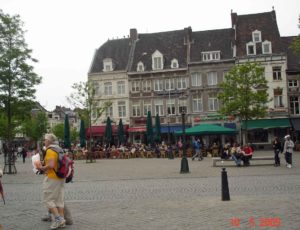
Vristhof – Famous Concert Square of Andre Rieu
Maastricht, a city situated on both side of the Meuse river with a population of around 182,000. Home to world-famous musician Andre Rieu. Maastricht is in the southeast of the Nederlands and the capital city of the Dutch province of Limburg. It has an oceanic climate, the same as most of the Netherlands. It is believed the city has existed since early roman times and may well be the oldest city in the Netherlands. Excavations of the remains of a Roman road, the bridge, a Roman bath (also one in Frankfurt), granary, houses, 4th century castrum walls(usually built around a fortified military camp) and gate, give evidence of Roman habitation. Visit the city’s public library where it has Roman artifacts on display from the Maastricht excavations.
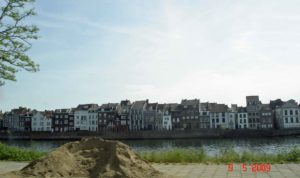
The quaint Dutch houses along the river bank are our first view of the lovely city of Maastricht. If you wonder who the statue is of at the northern end of the markt, this is the man who invented illuminating gas, Johannes Petrus Minckelers (1748-1824), holding the eternal burning flame. The markt square looks a bit grim at this hour of the morning.
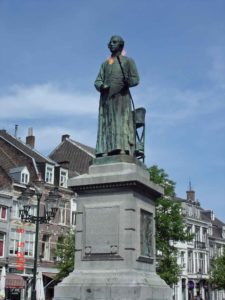
Johannes Petrus Minckelers (1748-1824), inventor of illuminating gas
Below, very quaint and colorful building known as the Dinghauis(courthouse), a building from the 15th century(built in 1417), and the tallest building in the city at that time. In medieval times the town trumpeter was placed in the tower as a fire watch to give a blast on his trumpet at any sign of fire in the town. The attic area also used as the town jail. Today, the Dinghauis serves as the Maastricht Tourist Office, a good place to start when you arrive in Maastricht.
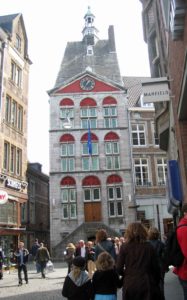
Maastricht Tourist Office
Old Town Hall
The old town Hall in the Markt is quite impressive, very austere. Originally built as a cloth hall, it has a neo-classical facade with pilasters and a handsome doorway approached by a double staircase. This had to be designed especially to enable the joint rulers of Maastricht, the Duke of Brabant and the Prince-Bishop of Liege, to enter the Town Hall simultaneously (oh dear!). The tower has a Hemony carillon of 43 bells.
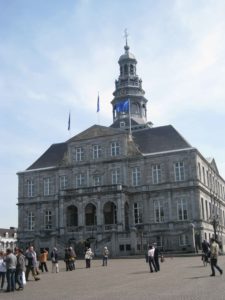
What is a Hemony carillon? – Traveling through the Netherlands and Germany we saw many carillon bells, two that come to mind- one in Keukenhof – Flower Gardens and one in Beautiful Lindau a German town on Lake Constance. Brothers Francois and Pieter Hemony were born in France to a family of bell founders who traveled throughout Europe to cast bells. The two brothers, working closely with musician and composer Jacob van Eyck, developing their ability to build and tune carillons to greatest effect as a musical instrument. The brothers considered the greatest carillon bell founders in the low countries in their time. Their carillon’s are found in cities and towns throughout the low country.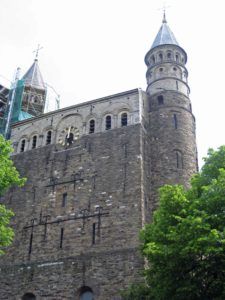
Above the Church of Our Lady (1100), an unusual building and intriguing example of Romanesque architecture with so-called west-work, which once served defensive purposes. Interestingly the Church site is inside the Roman castrum. The exterior has multiple stories between towers.The interior has an entrance vestibule, a chapel and a series of galleries overlooking the nave. The westwork feature introduced into Norman architecture in the 11th century. Very atmospheric church, some very ancient treasures,certainly worth a look inside.
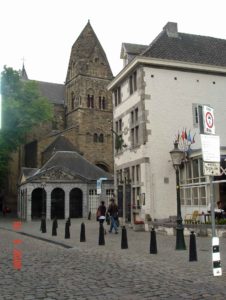
Apse and Barbara tower Church of our Lady
Traditional Bakery – Bisschopsmolen
In the centre of Maastricht the most mouth-watering aroma of freshly baked bread greeted us at the Bisschopsmolen or Bishop’s Mill bakery. Bisschopsmolen is a traditional bakery in the heart of Maastricht. It has a wonderful old watermill in use since the 11th century, and the oldest working watermill in Holland. Andre Rieu is a frequent visitor to this bakery.
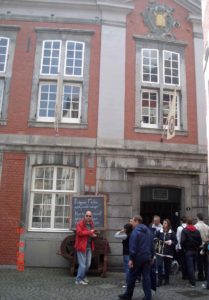
Bisschopsmolen Bakery front entrance
The mill works 6 days a week and is water driven from the Jeker river; it grinds all the grain for the bakery. Great coffee and a slice of old-fashioned savory flan made my day and satisfied my appetite, for a while at least. They have a wonderful array of breads and pastries. You can now do a tour of this aromatic, wonderful old bakery with its famous watermill, ancient stone walls and delicious fresh breads.
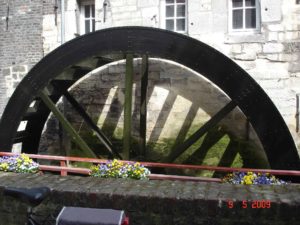
11th century water wheel- traditional bakery Maastricht
City Wall 1229
A very pretty area in Lange Grachtje street with a view of the first city wall. This wall built in 1229 from sandstone and black coal to a length of 2400 metres and a height of five metres; built with arches, corridors and twelve towers.
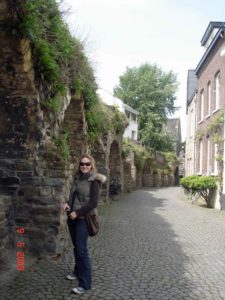
Across the fair ground we could see the steeples of two churches, Sint-Jansker, a Gothic church, with a distinctive red limestone tower, the main Protestant church in the city. Adjacent and only a few feet away from Sint Jansker is the Basilica of Saint Servatius. Below – sitting outside at the Grandcafe we enjoyed a delicious lunch with a view across the fairground to the grey towers of the Basilica of Saint Servatius.
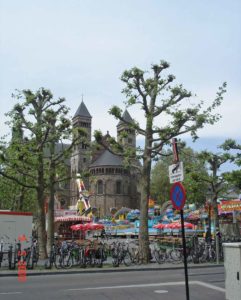
Maastricht Underground
Needing some more exercise after lunch and our earlier visit to the bakery, we set of for St Pietersberg Hill and Maastricht Underground. In a group of about eighteen with two oil lamps to lighten the way, one in the lead and one at the end of the pack, we set off to explore the underground tunnels of Maastricht. The subterranean network of caves was initially a quarry for sandstone blocks for building purposes, created by men hacking and sawing the blocks out. There are some 6,000 passageways, measuring 70 k in length, so do not stray from your guide, it would be very easy to get lost.
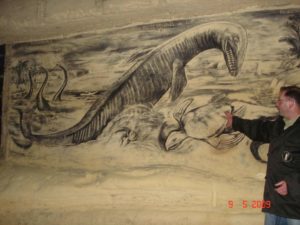
Once your eyes become accustomed to the darkness and lamp light, you are able to see names and drawings on the walls of the tunnels put there by people who worked in the quarry. Fossilized remains of sea creatures have been found embedded in the walls.The passageways also served as a place of refuge during sieges and wartime. Wells were dug in the caves,a bakery,a chapel and a hospital ward were built. The remains of these can still be seen. A trip through the caves was a bit of fun and very interesting. Make sure you wear a jacket as it’s about 10 degrees colder underground. It was nice to get out into the sun again.
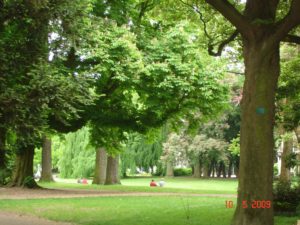
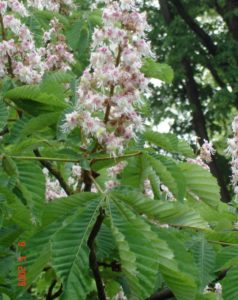
flowering pink tree Maastricht Park
Back in the city once more we followed the old wall through the archway and into this park in amazing hues of spring green, oh! so green, and trees with delicate pink flowering blossoms. Can anyone tell me the name of this tree? On the other side of the park we passed another old water wheel in the prettiest garden of a private home.
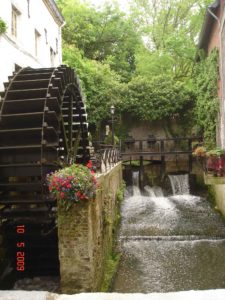
Below the Peter Vink Tren(tower) and the remains of the 14th century city wall. The tower named after a priest, accused of treason during the ‘Eighty Years’ War (against Spain).
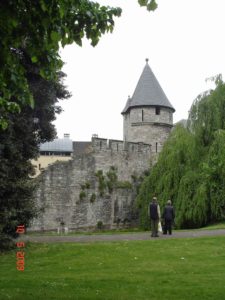
Famous concerts of Andre Rieu
Back at St Pieterstraut a band was playing some great music. Since this is the home of Andre Rieu, the sound of music seemed very appropriate. Vrijthof, the square where the world-famous concerts of Andre Rieu are held is very popular with tourists and residents alike, especially on a fine sunny day like today. I would so love to enjoy an Andre Rieu concert in this square. If we all made music instead of war, what a wonderful world it would be!
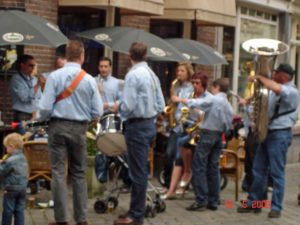
Enjoyed a farewell drink in the square before heading back to Heiloo. A quick trip back to for fresh bread before we set of home. A very enjoyable and interesting day in the warm and friendly city of Maastricht.
Related Posts:
- Bad Noord the beach at egmond Holland
- Heiloo Tulip Fields Holland Netherlands
- Keukenhof Flower Garden Lisse Holland
- Zaanse Schans – Color Windmill|Clog Factory Holland
- Canals – Amsterdam Canal Cruise | Holland Netherland
- Ceramics at Delft|Holland Netherlands
- About Delft – Delft Netherlands
- The Hague – Netherlands
- Art Galleries | museums|Red Light District Amsterdam
- Kaas or Cheese Market – de Waag – Alkmaar
- Haarlem – The Great Church and famous Pipe Organ – Nederlands
Speak Your Mind